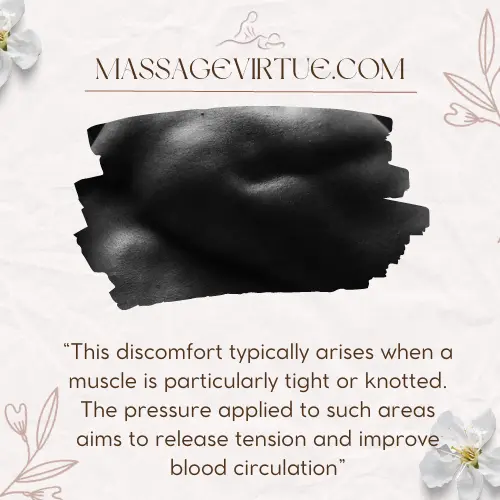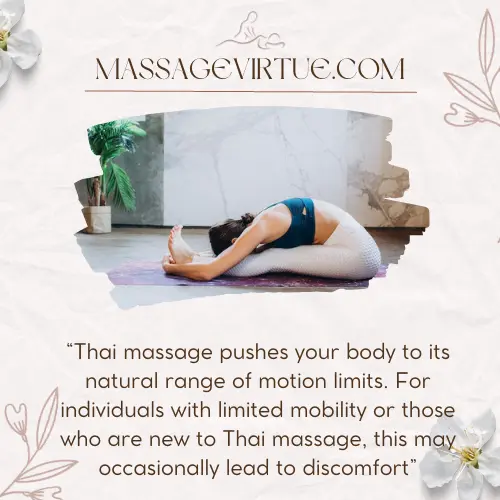Thai massage, known for its unique blend of acupressure, stretching, and yoga-like movements, is renowned for its relaxing and therapeutic benefits.
However, many people wonder whether Thai massage can actually hurt.
In this article, we’ll explore the question of whether a Thai massage can be painful and delve into the potential reasons behind any discomfort.
Does Thai Massage Hurt?
Thai massage, in its essence, is not supposed to be painful. It is designed to promote relaxation, alleviate muscle tension, and enhance flexibility.
However, the perception of pain can be subjective and dependent on various factors.
Let’s delve deeper into these potential reasons behind the discomfort associated with Thai massage.
Potential Reasons Why Thai Massage Can Be Painful
Muscle Tension:
Thai massage therapists often work on releasing muscle tension, which can cause discomfort.
This discomfort typically arises when a muscle is particularly tight or knotted.

The pressure applied to such areas aims to release tension and improve blood circulation.
While this can be momentarily painful, it should ultimately lead to relaxation and relief.
Pressure Points:
Thai massage focuses on acupressure points. These points are associated with various organs and systems in the body.
Pressure on these points can trigger sensations ranging from mild discomfort to slight pain if they are sensitive or blocked.
This discomfort is usually short-lived and is an integral part of the therapeutic process.
Stretching:
Thai massage involves passive stretching, which can be intense, especially if your muscles are not accustomed to such movements.
This stretching aims to improve flexibility and release tension.
While some discomfort may be felt during stretches, it should not result in lasting pain.
Communicating your comfort level with your therapist is essential to ensure the stretches are within your tolerance.
Range Of Motion:
Thai massage pushes your body to its natural range of motion limits.
For individuals with limited mobility or those who are new to Thai massage, this may occasionally lead to discomfort.

However, the therapist should always work within your comfort zone to prevent any pain.
Energy Lines:
Thai massage is based on the concept of energy lines or Sen lines. The therapist works on these lines to release energy blockages and improve overall well-being.
In some cases, working on congested or blocked energy lines can be momentarily uncomfortable, but the goal is to restore the natural flow of energy, resulting in relaxation and relief.
History Of Injuries:
Past injuries or underlying health issues can make certain areas more sensitive to massage, potentially causing pain.
It’s crucial to inform your therapist about any injuries or medical conditions so they can tailor the massage to your specific needs and limitations.
Personal Threshold:
Pain thresholds vary among individuals. What one person finds comfortable, another might perceive as painful.

It’s important to communicate your comfort level to your therapist, who can then adjust the pressure and techniques accordingly.
Technique and Experience:
The skill and experience of the Thai massage therapist play a crucial role in the comfort of your experience.
An experienced therapist can identify your specific needs and tailor the massage to ensure it is effective and comfortable.
Inexperienced therapists may inadvertently cause discomfort if they use excessive force or improper technique.
Deeper Healing:
In some cases, Thai massage is intended for deeper healing, such as addressing chronic pain or tension.
This may involve a degree of discomfort in order to release deep-seated tension.
However, the therapist should always work within your tolerance level and adjust the pressure as needed.
Hydration and Warm-up:
Dehydration and a lack of proper warm-up can make the muscles more sensitive, potentially increasing the perceived pain during a massage.

It’s advisable to stay well-hydrated, keep an eye on your diet, and engage in light stretching before your session to prepare your muscles for the massage.
Communication:
Effective communication between you and the therapist is essential.
If you are experiencing pain or discomfort during the massage, don’t hesitate to speak up.
A skilled therapist will adjust their techniques to ensure your comfort and satisfaction.
Conclusion:
In summary, a traditional Thai massage is not intended to hurt. It’s designed to provide relaxation and therapeutic benefits.
However, pain or discomfort can be subjective and depend on several factors, including personal sensitivity, the therapist’s technique, and your body’s condition.
Communication with your therapist is key to ensuring a comfortable and beneficial experience.
Remember that the discomfort experienced during a Thai massage is usually short-lived and is part of the process of releasing tension and improving overall well-being.
If you are new to Thai massage or have specific concerns, discussing them with your therapist before the session begins is a wise step.
Ultimately, a well-executed Thai massage should leave you feeling relaxed, rejuvenated, and free from any lasting discomfort.
So, go ahead and enjoy the healing benefits of this ancient and remarkable practice

